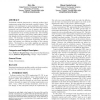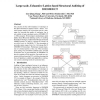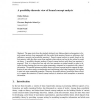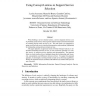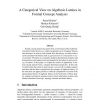129
click to vote
JIPS
2010
14 years 9 months ago
2010
Test scenarios can be derived based on some system models for requirements validation purposes. Model-based test suite reduction aims to provide a smaller set of test scenarios whi...
152
click to vote
AOSD
2009
ACM
14 years 12 months ago
2009
ACM
Traditional methods characterize a software product line's requirements using either functional or quality criteria. This appears to be inadequate to assess modularity, detec...
116
click to vote
KSEM
2010
Springer
15 years 3 hour ago
2010
Springer
One criterion for the well-formedness of ontologies is that their hierarchical structure forms a lattice. Formal Concept Analysis (FCA) has been used as a technique for assessing ...
142
click to vote
ICSOC
2010
Springer
15 years 18 days ago
2010
Springer
Service-Oriented Computing (SOC) has gained considerable popularity for implementing Service-Based Applications (SBAs) in a flexible and effective manner. The basic idea of SOC i...
125
Voted
ADBIS
2010
Springer
15 years 1 months ago
2010
Springer
Abstract. As XML becomes a popular data representation and exchange format over the web, XML schema design has become an important research area. Formal Concept Analysis (FCA) has ...
148
click to vote
SAC
2008
ACM
15 years 1 months ago
2008
ACM
We present a way to add user's background knowledge to formal concept analysis. The type of background knowledge we deal with relates to relative importance of attributes in ...
112
click to vote
FUIN
2007
15 years 2 months ago
2007
Abstract. The paper starts from the standard relational view linking objects and properties in formal concept analysis, here augmented with four modal-style operators (known as suf...
136
click to vote
FSS
2007
15 years 2 months ago
2007
Formal concept analysis and rough set theory are two important tools in knowledge representation and knowledge discovery in relational information systems. The purpose of this pap...
119
click to vote
FUIN
2006
15 years 2 months ago
2006
Formal concept analysis has grown from a new branch of the mathematical field of lattice theory to a widely recognized tool in Computer Science and elsewhere. In order to fully be...

